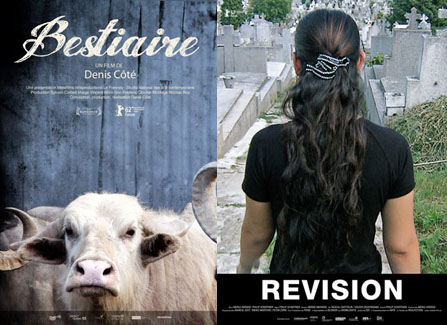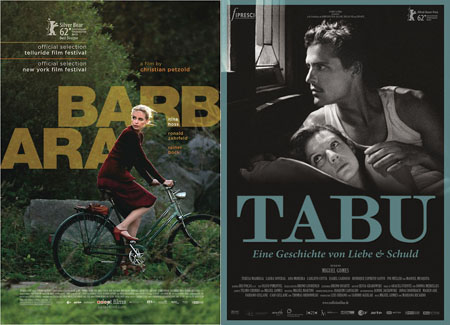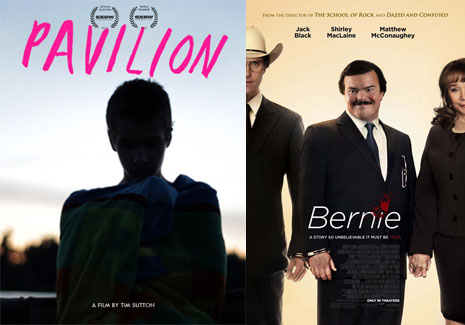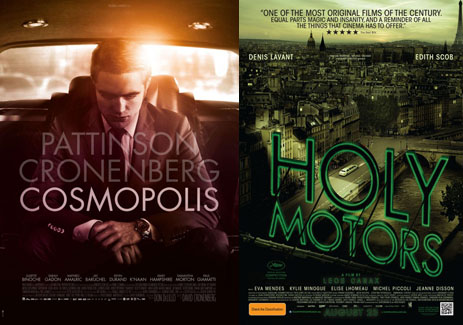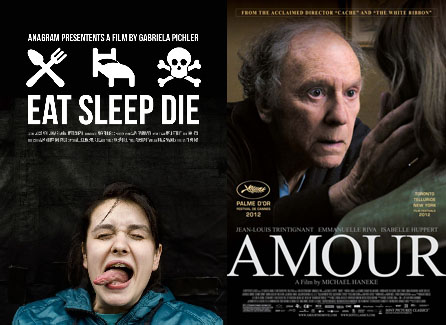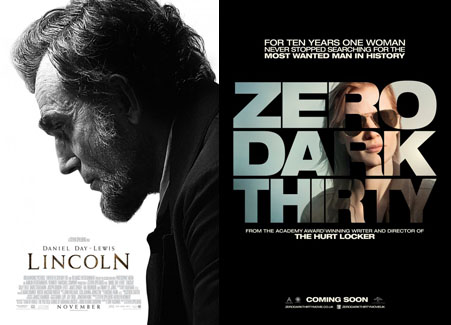So that was 2012. We lost Chris Marker and Andrew Sarris, but film culture carries on mutating and thriving. Exhibit A: This summer, Peter Labuza launched a podcast series, The Cinephiliacs, in which he interviews critics and discusses a film of his or her choice. I’m still working my way through the archive (these are long conversations, but I wouldn’t cut a minute from any that I’ve listened to so far). Yes, most of the interviewees are New Yorkers, but their backgrounds are as richly varied as their areas of specialty. You’ve got, for starters, Glenn Kenny on how writing about music in the City during the now legendary early 80s informs his current reviews and the conversations he moderates at Some Came Running, Bilge Ebiri on the Hollywood New Wave rolling over him in Turkey, Farran Smith Nehme, hailing from Alabama, on Jean Negulesco’s rarely seen noir Three Strangers (1946), the great Godfrey Cheshire on the Iranian Wave of the 1990s, and fellow Texan Matt Zoller Seitz on his smooth transition from full-time film critic to full-time television critic.
And The Cinephiliacs is just one of countless podcasts streaming movie talk while the means of expressing a passion for cinema proliferate. Twitter and Facebook are by now well-established forums, and this year, as I launched our tumblr, I became enamored with the tool’s potential. The Chiseler is a stellar example of its use as a publication platform, while Cinephilia & Beyond, an all but overwhelming flow of screenplays and docs on filmmakers, reminds us, day in and day out, that, whatever the form, if it’s made of 0s and 1s, it can be disseminated immediately. Among my many, many favorites of those tumbling more “traditionally” are This Must Be the Place, Letter to Jane, We Had Faces Then, and Constant Shallowness Leads to Evil.
As Kevin B. Lee has been proving here in Keyframe at least once a week for a couple of years now, the video essay is alive and well—and evolving. Perhaps the most outstanding recent example of this form of criticism performing like no other can would be a piece Kevin did last month for Sight & Sound mapping Paul Thomas Anderson’s long takes in Hard Eight, Boogie Nights, Magnolia, Punch Drunk Love, and There Will Be Blood.
For all that, the written word is most certainly not dead. Perhaps the most beautiful celebration of the range and depth of the work going on right now is the enthusiastic response a couple of weeks ago when Matt Singer asked Criticwire contributors, “What was the best piece of film criticism you read in 2012?” Meantime, scholars, professional and amateur alike, remain, as always, grateful to no one more than our indispensable Borgesian librarian, Catherine Grant.
To the films of 2012. To briefly state the obvious, studios release many of their heftiest titles during the year-end holiday season, and these films won’t be crossing the Atlantic until the early months of the following year. As much as I love living in Berlin, I do have to opt out of polls such as Indiewire‘s because I don’t want to take votes away from potentially deserving titles I haven’t yet seen—this year, for example, contenders would be The Master and Django Unchained, both of which I’m still eagerly anticipating. I usually spend January catching up, but also previewing films slated for the Berlinale.
As Frédéric Jaeger noted just yesterday, the 2012 lineup was one of the Berlinale’s strongest in years. Four films, fully one third of my top dozen of 2012, premiered here in February. Two screened in the Forum, Denis Côté‘s Bestiaire, a quietly intense meditation on animals, the way we look at them, and the way they look back, and Philip Scheffner‘s Revision, an investigation into the deaths of two Romanian men, shot as they attempted to enter Germany from Poland, which, in 1992, meant crossing the border into the EU. Scheffner incorporates the camera, and with it, the viewer into the procedural as he measures perspectives onto the scene of the crime, or light conditions at the given hour, leading to, as the Museum of the Moving Image puts it (it’ll be screening on January 12 as part of the First Look series), “profoundly unsettling revelations about immigration and justice in Europe today.”
The two other Berlinale titles screened in Competition and, as I noted in October, either would have been a deserving winner of the Golden Bear. For the here and now, I have little to add to the second roundups on Christian Petzold‘s Barbara and Miguel Gomes‘s Tabu I posted just last week—other than to say that, if you get the chance to see either on the big screen, do take it.
For me, March is all about the annual trek to Austin and SXSW, and the discovery of this year’s edition was Tim Sutton’s exquisite debut, Pavilion. At 68 minutes, it’s a wisp of a thing that nonetheless transported me back to the desolate beauty of both the northeastern and southwestern American suburbs in which I spent my own teenage years. If you’re in Berlin, catch it on January 4 or 9 when it screens at Unknown Pleasures.
In the summer, I returned to Austin, and the city sprang a surprise on me, the most enjoyable moviegoing experience of 2012: watching Richard Linklater’s Bernie, set in Texas, featuring Texans talking about Texas and other Texans, with an audience of Texans (in Texas) who were just loving it. If it weren’t for Daniel Day-Lewis’s Abraham Lincoln, Jack Black’s Bernie would top my (nonexistent) list of performances of the year.
We need to take a quick break from my brisk walk through this list to note that if cinema had any such thing as a Person of the Year, that person would be Alfred Hitchcock. Britannia ruled the summer at any rate, what with the Olympics, Danny Boyle’s delightfully wacko opening ceremony and all, but not only did the BFI present its major Hitchcock retrospective, with its restorations of early works and so on, it also conducted Sight & Sound‘s once-every-ten-years polls of the greatest films ever—and of course, as you’ll remember, Hitchcock’s Vertigo (1958) toppled Orson Welle’s Citizen Kane (1941) from what had come to seem its permanent #1 spot on that list. I’m still honored to have been invited to submit a ballot, but I’m even more impressed by how much more inspiring so many other ballots were (and are) as well as by the sheer range of films voted for.
So back in Berlin, I caught David Cronenberg’s Cosmopolis and Leos Carax’s Holy Motors. For all the many other reasons I’ve included these two films on my list, you might well imagine just how the conceit—a box of screens (limousine windows, a mirror, flowing data) carries its passenger through a city from one vignette to the next, the connections between each rarely immediately perceptible, over the course of one very, very long day—would appeal to an obsessive online forager and aggregator.
Autumn brought another surprise, an invitation to serve on the jury of the New Auteurs program at the AFI Fest in Los Angeles. That was one damn fine week, and as it drew to a close, and it came time to deliberate, the four members of the jury (myself, Dana Harris, Gregg Kilday, and Bérénice Reynaud) were taken aback to discover that each of us had come ready to argue the case for the same film: Gabriela Pilcher’s feature debut, Eat Sleep Die. Nermina Lukač’s performance as a young Montenegrin-Swede who loses her factory job is another of the year’s best.
Speaking of performances. It was also at AFI Fest that I, frankly, found myself in awe of Jean-Louis Trintignant and Emmanuelle Riva’s in Amour, a film that I suspect many who’ve panned it would embrace if they saw it cold and had no idea that Michael Haneke had directed it. The you-are-in-LA moment that the AFI Fest gifted me with was Steven Spielberg’s introduction to the closing night gala presentation of Lincoln. To say the least, this is the “Obama-inflected Hollywood cinema” that J. Hoberman began the year looking for.
Just a couple of weeks ago now, I grabbed an opportunity to see the film that had just begun its ride atop the first year-end lists, the critics’ awards magnet, Kathryn Bigelow’s Zero Dark Thirty. Within the next few days, I hope to post a second entry pointing out that there are more debates to be had about this film besides the question of whether or not it’ll leave the impression in viewers’ minds that torture was instrumental in the hunt for Osama bin Laden. For now, I’ll wrap by noting that, if I were asked if I happened to have a favorite film critic of 2012, my spontaneous reply would be, yes. Ignatiy Vishnevetsky. Read him on The Master. Read him on Barbara. And for cinema’s sake, read him on Zero Dark Thirty.
Lists and Awards 2012: Index. For news and tips throughout the day every day, follow @KeyframeDaily on Twitter and/or the RSS feed. Get Keyframe Daily in your inbox by signing in at fandor.com/daily.

